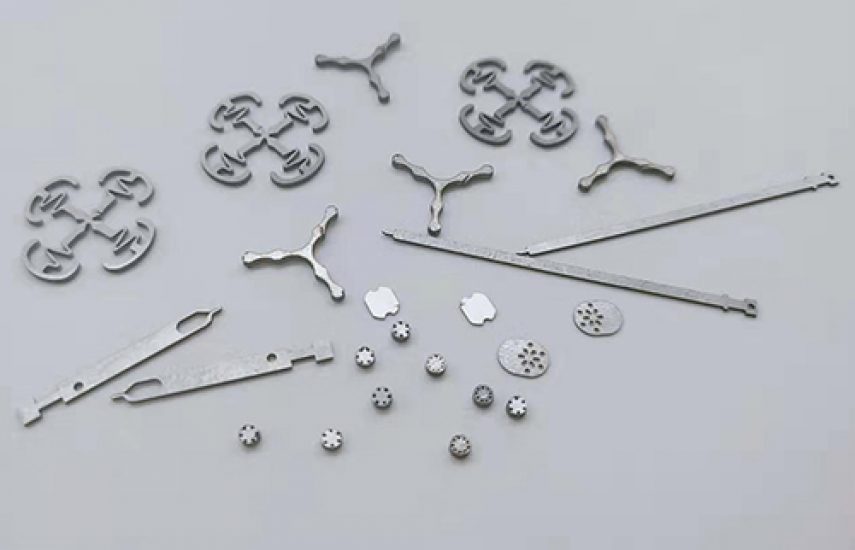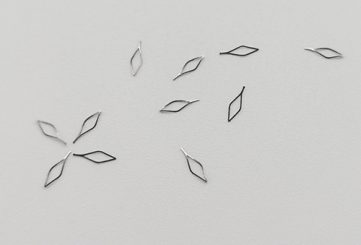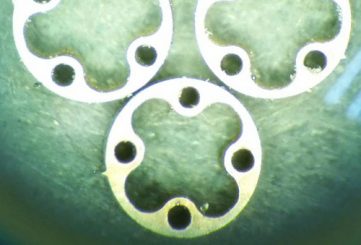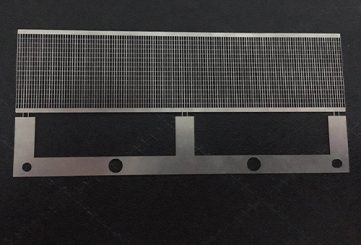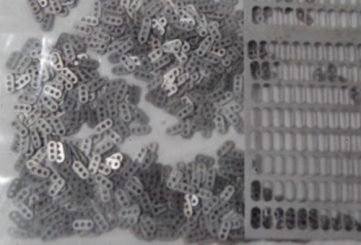Various Alloy Microstructure Components
Various Alloy Microstructure Components – Precision Parts for Medical and Industrial Applications
The Various Alloy Microstructure Component is a high-precision laser-machined part designed for advanced medical and industrial applications. Manufactured using state-of-the-art five-axis laser cutting technology, this component delivers exceptional accuracy, durability, and a burr-free finish. Crafted from high-performance alloys such as Nitinol, Cobalt-Chromium, and Platinum-Iridium, it offers tailored material properties for specific needs, including shape-memory, corrosion resistance, and biocompatibility. The laser-machined design ensures smooth surfaces and intricate microstructures, making it ideal for stents, catheters, and precision engineering components. Tailored for demanding environments, this component meets the rigorous standards of modern healthcare and high-tech industries.
תכונות עיקריות:
- Ultra-Precise Machining: Seam width of 18–30 µm with machining accuracy of ≤±10 µm for intricate microstructures.
- Burr-Free Finish: Smooth surfaces ensure safe use and minimal tissue interaction in medical applications.
- רבגוניות חומרית: Compatible with high-performance alloys like Nitinol, Cobalt-Chromium, and Platinum-Iridium.
- High Durability: Engineered for corrosion resistance and long-term stability in demanding environments.
- Automated Production: Continuous feeding system ensures high efficiency and consistent quality.
- ביולוגיות תאימות: Meets standards for safe interaction with human tissues in medical applications.
Certification and Standards:
Certified under ISO 9001, ISO 13485, and ISO 10993 for quality management and biocompatibility. Compliant with CE and FDA regulations for medical device safety and efficacy.
Stainless Steel SUS304:
Medical-grade SUS304 stainless steel (austenitic chromium-nickel alloy), offering excellent corrosion resistance and mechanical properties.
- ביולוגיות תאימות: Low risk of allergic reactions or toxicity, ideal for direct tissue contact in medical procedures.
- Mechanical Properties: High tensile strength (approximately 505 MPa) and elongation (up to 40%), providing flexibility without brittleness.
- Surface Finish: Laser-machined for smooth, burr-free edges, reducing the potential for tissue trauma or contamination.
- Thermal Stability: Maintains integrity across a wide temperature range, suitable for sterilization processes like autoclaving.
316L Stainless Steel:
316L Stainless Steel is a medical-grade austenitic chromium-nickel alloy renowned for its excellent corrosion resistance and biocompatibility. With a tensile strength of approximately 485–550 MPa and elongation up to 40%, it offers durability and flexibility without brittleness. Its low carbon content enhances weldability and resistance to intergranular corrosion, making it ideal for medical implants and instruments. Laser-machined for smooth, burr-free surfaces, it minimizes tissue irritation in sensitive applications.
Cobalt-Chromium Alloys (L605):
Cobalt-Chromium Alloys (L605) are medical-grade materials valued for their exceptional strength, corrosion resistance, and biocompatibility. With tensile strength ranging from 800–1500 MPa and hardness of 300–550 HV, they ensure durability in demanding medical applications. Ideal for implants and surgical tools, they support direct tissue contact with minimal reaction. Laser-machined surfaces provide smooth, burr-free finishes, enhancing performance in sensitive procedures.
Nickel-Titanium alloy:
ניטינול (NiTi), סגסוגת ניקל-טיטניום, ידועה באלסטיותה העל ובזיכרון הצורה שלה, מה שהופך אותה לפורצת דרך ביישומים רפואיים. עם חוזק מתיחה של עד 1200 מגה פסקל ומודול אלסטיות של 40-75 ג'יגה פסקל, ניטינול מצטיין בסביבות תובעניות.
Cobalt-chrome alloy:
קובלט-כרום (CoCr), סגסוגת של קובלט וכרום, שלעתים קרובות משופרת במוליבדן, מוערכת בזכות חוזקה יוצא הדופן, עמידותה בפני קורוזיה ותאימותה הביולוגית. עם חוזק מתיחה הנע בין 800 ל-1500 מגה פסקל וקשיחות של 300 ל-550 HV, CoCr הוא אבן יסוד בטכנולוגיה הרפואית. דרגות פופולריות כמו L605 (Co-Cr-W-Ni) ו-MP35N (Co-Cr-Ni-Mo) משפרות את ביצועיה.
Aluminum alloy:
Aluminum Alloys are lightweight, medical-grade materials valued for their excellent corrosion resistance and high strength-to-weight ratio. With tensile strength typically ranging from 200–600 MPa and good ductility, they offer durability for medical and industrial applications. Their biocompatibility supports use in non-implantable devices and components. Laser-machined for smooth, burr-free surfaces, they minimize contamination risks and ensure compatibility with sterilization processes.
Magnesium alloy:
Magnesium, a lightweight (1.74 g/cm³) and biodegradable metal, is ideal for temporary medical implants like stents and orthopedic screws. Alloys such as WE43 or JDBM offer tensile strength (200–420 MPa) and controlled degradation (6–24 months), safely dissolving into non-toxic byproducts (Mg²⁺ ions). Its biocompatibility (ISO 10993) and ability to support tissue regeneration make it suitable for cardiovascular and bone repair applications. Magnesium’s elastic modulus closely matches bone, minimizing stress shielding in orthopedic uses.
Lithium (Li):
A lightweight, highly reactive metal used in medical devices like batteries for implants. Its high energy density and biocompatibility make it ideal for powering pacemakers and neurostimulators.
Copper (Cu):
A conductive, antimicrobial metal used in medical equipment and coatings. Its excellent electrical conductivity and natural resistance to bacteria enhance device functionality and hygiene.
Iron (Fe):
A strong, durable metal used in some surgical instruments and structural components. Its high strength and cost-effectiveness make it suitable for non-implantable medical tools.
Ceramic:
A biocompatible, wear-resistant material used in orthopedic and dental implants. Its hardness, corrosion resistance, and bioinert properties ensure long-term stability and tissue compatibility.
- Medical Devices: Essential for stents, catheters, guidewires, and surgical tools in cardiovascular and orthopedic applications.
- Aerospace Components: Used in high-precision parts for aircraft, satellites, and spacecraft.
- Industrial Systems: Supports advanced filtration and structural components in electronics and automotive industries.
- Diagnostic Equipment: Incorporated in high-precision imaging and monitoring systems.
- Medical Device Manufacturing: Used in the production of advanced surgical and diagnostic instruments.
- Material: Nitinol, Cobalt-Chromium (L605, MP35N), Platinum-Iridium, Stainless Steel
- Cutting Seam Width: 18–30 µm
- Machining Accuracy: ≤±10 µm
- Surface Roughness: Ra <0.2 µm
- Manufacturing Process: Five-axis laser cutting with automated feeding
- Operating Temperature: -20°C to 300°C, suitable for sterilization
- Degradation: Non-degradable, designed for long-term stability

